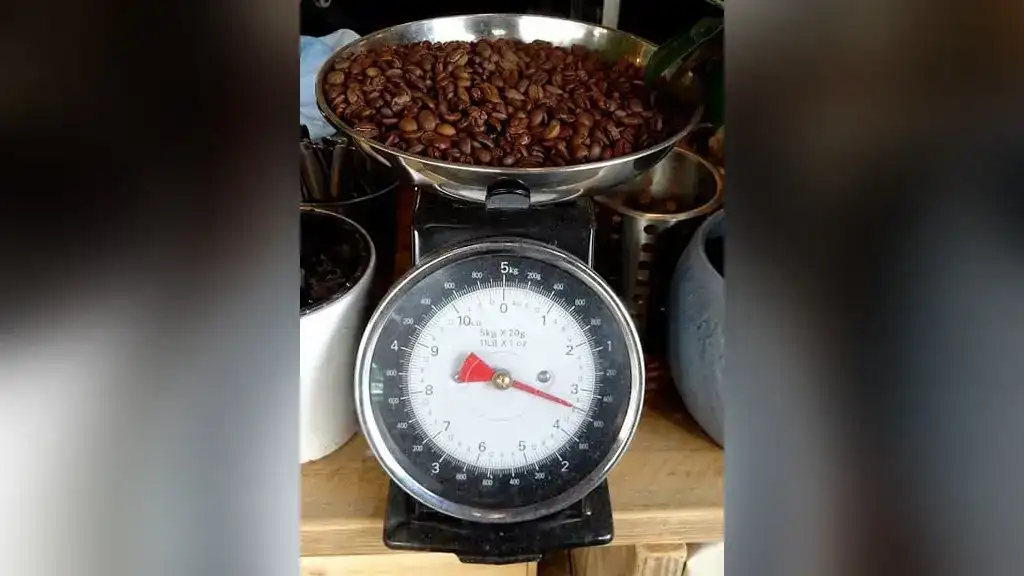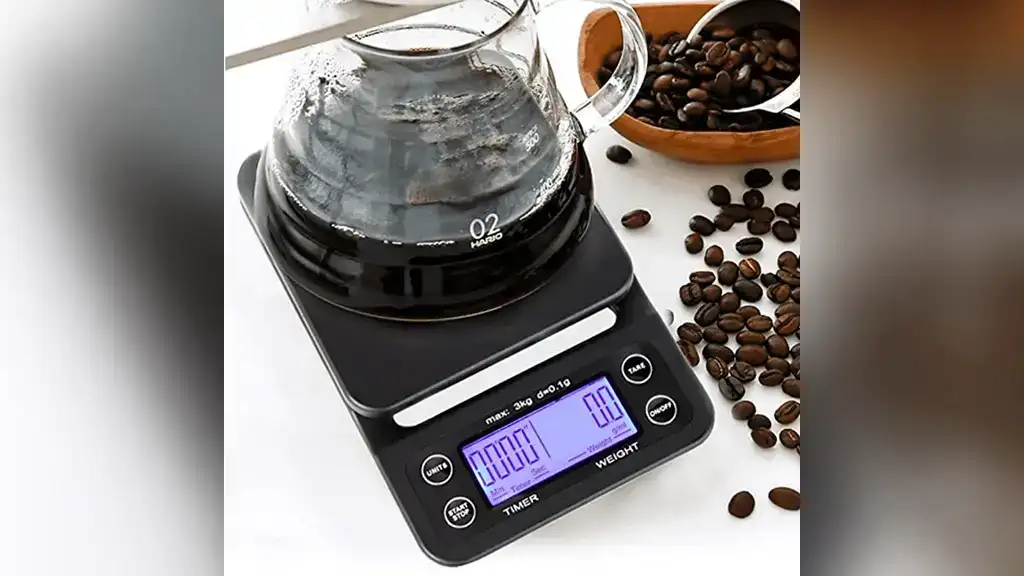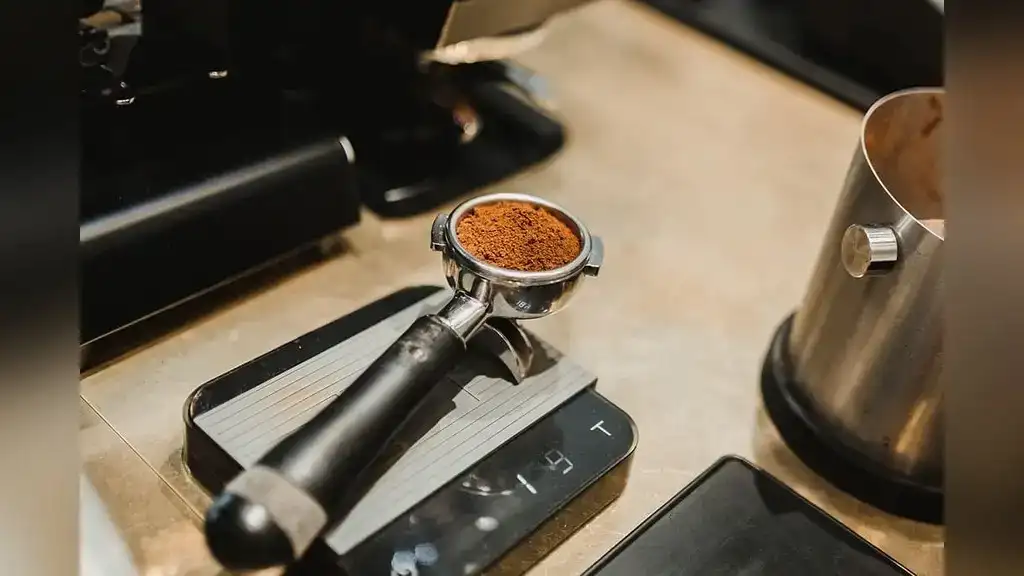If you’ve ever found yourself questioning the importance of precision when it comes to measuring your coffee or ingredients in the kitchen, this article is for you.
In this detailed comparison, we’ll delve into the world of Coffee Scale vs Kitchen Scale, exploring their designs, accuracies, functionalities, durability, calibration needs, portability, costs, and tech integration.
Strap in and get ready to discover the deeper meaning behind the battle of the scales.
Coffee Scale Vs Kitchen Scale: Design and Build
[youtube]https://youtu.be/SIzFhnZ32Y0[/youtube]
When comparing the design and build of coffee scales and kitchen scales, it’s important to consider their compactness.
Coffee scales are specifically tailored for measuring smaller quantities, making them ideal for precise brewing.
But did you know that the type of coffee scale you use can greatly influence your brewing results? Dive into our comprehensive guide on different types of coffee scales to find the perfect match for your brewing style.
Speaking of precision in coffee brewing, have you ever wondered about the different weight units used in coffee measurements? Our guide on decoding coffee weight units dives deep into this topic, ensuring you’re always on point with your measurements.
On the other hand, kitchen scales offer a broader range of design attributes that cater to various tasks in the kitchen.
Their versatility allows for measuring larger quantities and accommodating different ingredients. If you’re a coffee enthusiast, understanding the benefits of using a coffee scale can elevate your brewing game to new heights.
Compactness of Coffee Scales
If you’re looking for a compact solution for measuring smaller quantities, the coffee scale is specifically designed for that purpose compared to the kitchen scale.
Here are some key points to consider:
- Importance of precision in coffee brewing: Coffee scales are essential for achieving the perfect brew by accurately measuring the coffee grounds and water ratios.
- Unique features of coffee scales: These scales often have built-in timers and specialized modes for brewing methods like pour-over or espresso, allowing for precise control over the brewing process.
- Versatility of kitchen scales in different cooking tasks: While kitchen scales can measure a wide range of ingredients for various recipes, coffee scales are tailored specifically for coffee-related tasks.
- Comparing the durability of coffee scales and kitchen scales: Coffee scales are typically designed to be more durable and resistant to water and heat, as they’re often used in coffee brewing environments.
- The need for calibration in both coffee scales and kitchen scales: Regular calibration is necessary to ensure accurate measurements, regardless of the type of scale you’re using.
Speaking of durability, have you ever wondered how to maintain your coffee scale for longevity? Here are some maintenance hacks for your coffee scale to keep it in pristine condition.
Versatility of Kitchen Scales
If you’re looking for a versatile kitchen tool, the kitchen scale offers a range of design attributes suitable for various kitchen tasks compared to the coffee scale.
While the coffee scale is specifically designed for measuring coffee grounds with precision, the kitchen scale can accommodate a wider range of ingredients and quantities.
While discussing the versatility of scales, it’s essential to mention the variety of coffee scales available. Our comprehensive list of the top coffee scales showcases the best in the market, tailored for every coffee aficionado.
Its larger surface area and higher weight capacity allow for measuring larger quantities of ingredients for cooking and baking.
Additionally, kitchen scales often come with unique features such as a built-in timer or a conversion function for different units of measurement.
In terms of durability and lifespan, kitchen scales are typically built to withstand the demands of everyday kitchen use, making them a reliable long-term investment for any home cook or baker.
But for those who are passionate about coffee, investing in a digital coffee scale can offer modern precision that’s hard to beat.
Coffee Scale Vs Kitchen Scale: Precision and Sensitivity
When it comes to precision and sensitivity, the coffee scale and kitchen scale each have their own strengths. If you’re often on the move and need a reliable scale, consider checking out these travel-friendly coffee scales that ensure precision wherever you go.
The coffee scale excels in providing the minute precision required for precise coffee brewing, ensuring that every gram of coffee is measured accurately.
On the other hand, the kitchen scale offers broad versatility, accommodating a range of ingredients with varied precision needs, making it a valuable tool for various cooking and baking tasks.
The Fine Margins of Coffee Scales
You need to understand the minute precision of coffee scales and the importance it holds in brewing the perfect cup of coffee.
When comparing coffee scales and kitchen scales for brewing precision, there are several key features to consider:
- Features Comparison: Coffee scales are specifically designed for coffee brewing, offering features like built-in timers and specific brewing modes.
- Liquid Resistance: Coffee scales are designed to withstand exposure to liquids, ensuring accurate measurements even in the presence of spilled coffee or water.
- Weight Capacity: Coffee scales often have a lower weight capacity than kitchen scales, as they’re tailored to the needs of coffee brewing, where smaller quantities are typically measured.
- Brewing Accuracy: Coffee scales provide a higher level of accuracy for measuring coffee grounds and water, allowing for precise ratios and consistent brewing results.
Accuracy is crucial, but so is maintaining your equipment. Discover some handy coffee scale maintenance hacks to ensure your scale remains in top-notch condition, delivering precise measurements every time.
Understanding these differences will help you choose the ideal scale for your coffee brewing needs.
Broad Versatility in Kitchen Scales
While coffee scales are designed with precision for specific coffee brewing needs, kitchen scales offer a broad versatility in accommodating a range of ingredients with varied precision.
When it comes to ingredient precision, both coffee scales and kitchen scales are capable of providing accurate measurements.
However, coffee scales are specifically calibrated for the precise measurements needed in coffee brewing, while kitchen scales are designed to handle a wider range of ingredients and measurements.
In terms of usage scenarios, coffee scales excel in tasks related to coffee brewing, such as measuring the exact amount of coffee grounds or water needed for a specific brewing method.
On the other hand, kitchen scales are indispensable in a variety of recipes, from baking to cooking, where precise ingredient measurements are crucial for achieving desired results.
Ever been in a dilemma between eyeballing your coffee measurements and using a scale? Our article on eyeballing vs. coffee scales delves into this debate, helping you make an informed decision.
When it comes to brewing techniques, coffee scales are often used in pour-over methods like the V60 or Chemex, where precise water-to-coffee ratios are essential.
Kitchen scales, on the other hand, can support various cooking techniques, such as sous vide or precision cooking, where precise ingredient measurements are necessary for achieving desired flavors and textures.
In terms of weight capacity, coffee scales generally have a lower maximum weight capacity compared to kitchen scales.
Coffee scales typically have a capacity of around 500 grams, which is sufficient for coffee brewing needs.
Kitchen scales, on the other hand, can handle larger quantities, often up to several kilograms, making them suitable for a wide range of cooking needs.
Lastly, when considering the user-friendly interface, both coffee scales and kitchen scales are designed to be intuitive and easy to use.
They typically feature a digital display that shows the weight measurement, and most models allow for easy taring or resetting of the scale to zero. This makes it convenient to weigh multiple ingredients in the same container without the need for manual calculations.
Coffee Scale Vs Kitchen Scale: Functionalities and Features
Let’s explore the unique features that set the Coffee Scale and Kitchen Scale apart from each other.
Coffee scales often come equipped with built-in timers and water resistance, catering specifically to the needs of coffee enthusiasts.
While discussing functionalities, it’s worth noting the various features a coffee scale can offer. Check out our coffee scale features checklist to ensure you’re getting the most out of your brewing companion.
On the other hand, kitchen scales offer functionalities like taring and unit conversion, making them more versatile for general culinary purposes.
Coffee Scale Specialties
The Coffee Scale’s built-in timer and water resistance are some of its unique features that set it apart from the Kitchen Scale. Here are some functionalities and features of the Coffee Scale that make it ideal for coffee enthusiasts:
- Built-in timers: The Coffee Scale allows you to precisely time your coffee brewing process, ensuring optimal flavor extraction.
- Water resistance: Unlike the Kitchen Scale, the Coffee Scale is designed to withstand accidental spills and splashes, making it a durable option for your coffee brewing station.
- Measurement accuracy: The Coffee Scale provides precise measurements of coffee grounds and water, allowing you to consistently achieve the perfect brew.
- Compact size: With its compact design, the Coffee Scale takes up minimal space on your countertop, leaving more room for other brewing essentials.
For those who love brewing on the move, consider the convenience of travel coffee scales. Our guide on travel coffee scales for every destination ensures you never compromise on precision, no matter where you are.
The Coffee Scale’s versatility in brewing methods, combined with its unique features, makes it a must-have tool for any coffee lover.
General Utility of Kitchen Scales
You’ll be amazed by the general utility of kitchen scales and how they can make your cooking experience even better by offering functionalities like taring and unit conversion.
When it comes to accuracy comparison, both coffee scales and kitchen scales are designed to provide precise measurements. However, coffee scales tend to have a higher level of accuracy due to their specialized focus on coffee brewing.
In terms of practicality, taring is a common feature found in both coffee scales and kitchen scales. Taring allows you to reset the scale to zero after placing a container on it, making it easier to measure ingredients accurately.
Additionally, both scales offer unit conversion capabilities, allowing you to switch between different units of measurement effortlessly.
When comparing weight capacity, kitchen scales generally have a higher weight capacity compared to coffee scales.
Lastly, both coffee scales and kitchen scales are designed with user-friendly interfaces, making them easy to use and navigate.
Coffee Scale Vs Kitchen Scale: Durability and Lifespan
When it comes to durability, the Coffee Scale faces unique challenges due to frequent liquid interactions. From spills to condensation, the coffee scale must be designed to withstand and resist damage caused by these factors.
On the other hand, the Kitchen Scale is built to be robust and handle diverse kitchen ingredients and conditions, making it more resistant to wear and tear in the long run.
Understanding the specific environments and usage patterns of these scales is crucial in determining their durability and lifespan.
Coffee Scale Wear and Tear
While using a coffee scale or kitchen scale, you may encounter challenges and durability issues due to frequent liquid interactions. Coffee scales are designed to withstand the demands of coffee brewing, including the potential spills and splashes that come with it.
However, the constant exposure to liquid can still pose certain maintenance and durability concerns.
Here are some aspects to consider:
- Liquid resistance: Coffee scales are often equipped with a water-resistant coating or material to protect the internal components from damage caused by liquid exposure.
- Durability concerns: Despite their liquid resistance, coffee scales may still experience wear and tear over time. The constant contact with water or other liquids can lead to corrosion or damage to the scale’s surface or internal parts.
- Frequent use challenges: Coffee scales are often used on a daily basis, which means they’re subjected to more frequent wear and tear than kitchen scales that may be used less often.
- Long-term reliability: While coffee scales are designed to withstand liquid interactions, it’s important to ensure proper maintenance and care to ensure their long-term reliability.
Understanding these challenges and taking appropriate measures for coffee scale maintenance can help prolong its lifespan and ensure accurate measurements for your brewing needs.
Robustness of Kitchen Scales
When comparing the robustness of kitchen scales, it’s important to emphasize the design considerations that enable them to handle diverse kitchen ingredients and conditions.
A kitchen scale must be able to accurately measure the weight of various ingredients, such as liquids, powders, and solids, with precision requirements that meet the standards of recipe measurements.
The design of the scale should also take into account ingredient compatibility, ensuring that it can handle different types of ingredients without compromising measurement accuracy.
Additionally, durability factors play a crucial role in the lifespan of the kitchen scale. It should be able to withstand the demands of daily use, including exposure to moisture, heat, and frequent cleaning.
Coffee Scale Vs Kitchen Scale: Calibration Needs
When it comes to calibration needs, the coffee scale and kitchen scale differ in their requirements.
The coffee scale necessitates regular calibration to achieve precise brewing results.
On the other hand, the kitchen scale only occasionally needs calibration due to its varied use.
Understanding these differences will help you ensure the accuracy of your measurements in both scales.
Regular Calibration in Coffee Scales
To ensure accurate brewing results, you need to regularly calibrate your coffee scale and kitchen scale. Calibration is essential for both scales as it ensures that the measurements are precise and reliable.
Here are some reasons why regular calibration is imperative:
- Coffee Scale Calibration: Coffee scales are specifically designed for brewing coffee, taking into account the physical attributes of coffee beans and the need for precise measurements. Regular calibration of a coffee scale ensures that you achieve the perfect brew every time.
- Precise Brewing Results: Calibration guarantees accurate measurements, which directly impact the flavor and strength of your coffee. By calibrating your coffee scale regularly, you can achieve consistent and precise brewing results.
- Smaller Quantities: Coffee scales are designed to measure smaller quantities of coffee accurately. Regular calibration ensures that even the smallest measurements are precise, allowing you to maintain control over your brewing process.
- Kitchen Scale Versatility: While kitchen scales are versatile and can be used for various cooking needs, calibration is still crucial. Regular calibration ensures accuracy when measuring ingredients for recipes, resulting in delicious and perfectly balanced dishes.
Occasional Calibration in Kitchen Scales
Sometimes, you may need to calibrate your kitchen scale due to its varied use. Unlike a coffee scale that is specifically designed for measuring coffee grounds with precision, a kitchen scale is more versatile and can be used for a wide range of ingredients and recipes.
This versatility can affect its calibration needs. Since different ingredients have different densities and weights, it is important to calibrate your kitchen scale occasionally to ensure accurate measurements.
While coffee scales are built for precision, kitchen scales prioritize durability and versatility, which can result in occasional calibration needs.
It is recommended to follow the manufacturer’s instructions for calibration or seek professional assistance to ensure your kitchen scale remains accurate and reliable.
| Kitchen Scale Calibration Needs |
|---|
| Varied use of ingredients |
| Versatility of kitchen scale |
| Different densities and weights |
| Prioritizing durability |
| Accurate measurements |
| Occasional calibration needs |
Coffee Scale Vs Kitchen Scale: Portability and Storage
When it comes to portability, coffee scales have the upper hand with their compact designs that are travel-friendly and easy to carry. These scales are specifically designed for on-the-go brewing, making them perfect for coffee enthusiasts who want to enjoy their favorite brew wherever they go.
On the other hand, kitchen scales are typically bulkier and meant for countertop storage in home kitchens, providing a more permanent solution for weighing ingredients during cooking and baking.
Travel-Friendly Coffee Scales
You’ll love the compact design of these travel-friendly coffee scales, perfect for brewing on-the-go. Here are some key features to consider when comparing coffee scales and kitchen scales for portable brewing:
- Compact brewing: Coffee scales are specifically designed for coffee brewing, making them more compact and lightweight compared to kitchen scales. This makes them easier to carry in your backpack or luggage when traveling.
- Precision brewing: Coffee scales offer high levels of accuracy, allowing you to measure the exact amount of coffee and water needed for your brew. Kitchen scales may not provide the same level of precision, which can affect the taste and consistency of your coffee.
- Versatile measurements: Coffee scales often come with specific measurement units for coffee brewing, such as grams and ounces. They also have built-in timers for precise brewing. Kitchen scales, on the other hand, may offer a wider range of measurement units, but may not have the same timer functionality.
- Durability in travel: Coffee scales are designed to withstand the rigors of travel and outdoor settings. They’re often made with durable materials that can withstand bumps and drops. Kitchen scales may not have the same level of durability, as they’re primarily designed for indoor use.
Kitchen Scales in Home Kitchens
If you’re looking for a kitchen scale that is easy to transport and store in your home kitchen, it’s important to consider the typically bulkier designs of kitchen scales compared to coffee scales.
While coffee scales are designed with portability in mind, kitchen scales are meant to be kept on the countertop for convenient access during cooking and baking. This difference in design affects the practicality, space-saving options, and accuracy in measuring of the two types of scales.
| Practicality Comparison | Space Saving Options |
|---|---|
| Coffee Scale | Compact and lightweight |
| Kitchen Scale | Bulkier and heavier |
| Accuracy in Measuring | Specialty Brewing Needs |
| Coffee Scale | Precision in ingredient measurement |
| Kitchen Scale | Suitable for general cooking and baking needs |
While coffee scales excel in precision and specialty brewing needs, kitchen scales are more versatile and suitable for everyday cooking and baking. However, if portability and space-saving options are your priorities, a coffee scale might be the better choice for your home kitchen.
Coffee Scale Vs Kitchen Scale: Cost Implications
When it comes to coffee scales, premium options may come with a higher price tag due to their specialized features and precision. However, it’s important to consider the value for money that these scales provide in terms of accuracy and consistency in brewing your perfect cup of coffee.
On the other hand, kitchen scales offer a range of price points that cater to different budgets, making them a more affordable option for general weighing needs in the kitchen.
Premium Coffee Scales
Looking for precision in your coffee brewing? Consider the cost implications of specialized features when choosing between a coffee scale and a kitchen scale.
- Precision vs Cost:
- Coffee scales are specifically designed for accurate coffee measurements, while kitchen scales may have a broader range of uses.
- Coffee scales often come with built-in timers, allowing you to time your brews for optimal flavor extraction.
- Specialized Features:
- Coffee scales offer minute precision, measuring coffee to the nearest 0.1 grams, ensuring consistent brewing ratios.
- Some coffee scales have auto-tare functions, which subtract the weight of your brewing vessel for more accurate measurements.
When it comes to accuracy levels and minute precision, coffee scales outshine kitchen scales. However, these specialized features do come at a price.
Coffee scales tend to be pricier compared to kitchen scales due to their precision and additional functionalities. Consider your budget and brewing needs when deciding between a coffee scale and a kitchen scale.
While considering costs, it’s also essential to think about the environment you’ll be using your scale in. For those prone to spills, our article on waterproof coffee scales might be a game-changer.
Kitchen Scale Affordability
Considering your budget and weighing the value for money, you’ll find that kitchen scales offer a range of price points compared to the pricier coffee scales. When it comes to affordability, kitchen scales are the more cost-effective option.
Market analysis shows that there’s a wide price range breakdown for kitchen scales, catering to different consumer preferences and needs.
Entry-level kitchen scales can be found for as low as $10, while more advanced models with additional features can range from $20 to $50. These price variations allow consumers to choose a kitchen scale that fits their budget without compromising on quality.
With the increasing popularity of home cooking and baking, affordable kitchen scales have become essential tools in the kitchen. So, if you’re looking for a cost-effective option, kitchen scales are a great choice.
Coffee Scale Vs Kitchen Scale: Tech Integration and Modern Features
When it comes to tech integration and modern features, both coffee scales and kitchen scales have made significant advancements.
Smart coffee scales now come with digital displays that provide precise measurements and app connectivity that allows you to track your brewing process.
On the other hand, some advanced kitchen scales also offer features like digital displays and touch controls, although they may be less common than in coffee scales.
These technological advancements enhance the accuracy and convenience of both types of scales, making them valuable tools in the kitchen.
Dive into our exploration of coffee scales with timers and understand why they’re a modern brewer’s essential tool.
Smart Coffee Scales
You can easily compare the digital displays and app connectivity of modern coffee scales and kitchen scales to assess their technological advancements. When it comes to smart coffee scales, they offer several features that set them apart from traditional kitchen scales.
Here are some notable differences:
- Digital displays: Smart coffee scales come with clear and easy-to-read digital displays that provide accurate weight measurements in real-time.
- App connectivity: These scales can be connected to your smartphone or tablet via a dedicated app, allowing you to track and record your brewing process, save recipes, and even receive brewing recommendations.
- Physical attributes: Smart coffee scales are designed specifically for coffee brewing, with features like built-in timers, water-resistant surfaces, and spill-proof designs.
- Compactness and broader design: Unlike traditional kitchen scales, smart coffee scales are often more compact and sleek, taking up less counter space and fitting seamlessly into your coffee brewing setup.
With their digital displays and app connectivity, smart coffee scales offer a range of modern features that enhance the precision and convenience of your coffee brewing process.
Advanced Kitchen Scales
With fewer technological advancements, some kitchen scales still offer features like built-in timers and water-resistant surfaces. While coffee scales often prioritize precision and specialized functions, kitchen scales focus more on general weighing tasks.
In terms of weight capacity, both coffee scales and kitchen scales typically have a maximum weight capacity of around 11 pounds (5 kilograms).
When it comes to speed and response time, coffee scales tend to have faster and more accurate measurements due to their specialized design for coffee brewing.
In terms of ease of cleaning, both coffee scales and kitchen scales usually have removable platforms or surfaces that can be easily wiped clean.
The user interface of coffee scales is often more streamlined and intuitive, with features like backlit displays and touch-sensitive buttons.
As for power source, both coffee scales and kitchen scales usually run on batteries, although some kitchen scales may also have the option for AC power.
Conclusion
In conclusion, the comparison between the Coffee Scale and Kitchen Scale reveals some fascinating insights.
One interesting statistic to note is that the Coffee Scale has a precision level of 0.1 grams, while the Kitchen Scale has a precision level of 1 gram. This means that the Coffee Scale offers a much higher level of accuracy for those who are passionate about brewing their perfect cup of coffee.
The attention to detail and precise measurements provided by the Coffee Scale make it a compelling choice for coffee enthusiasts.

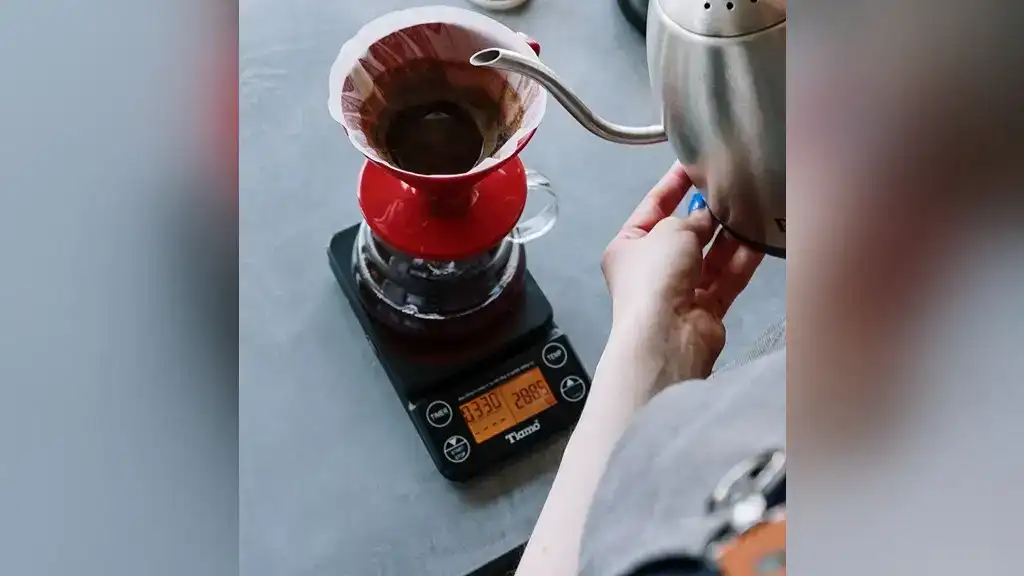




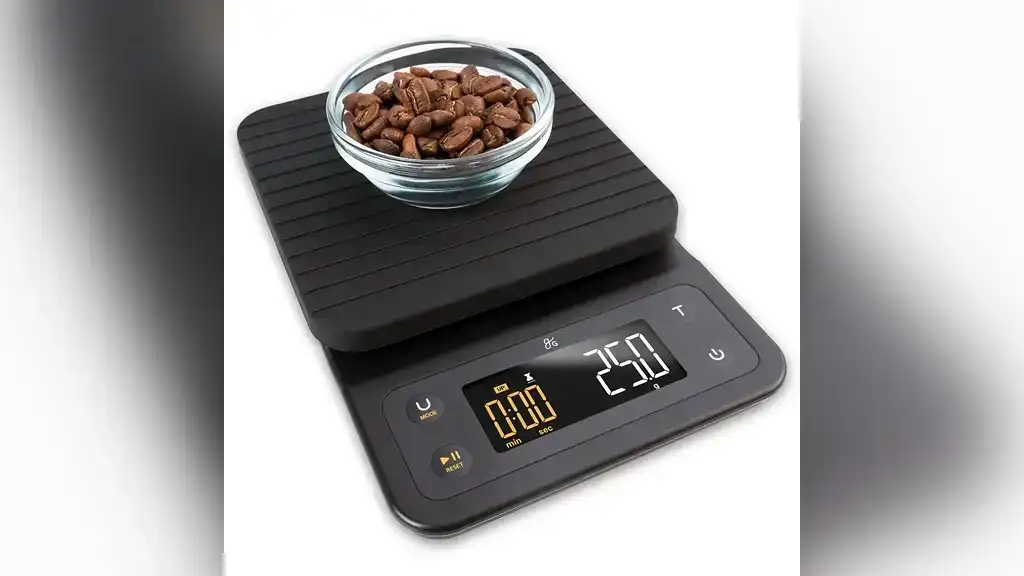
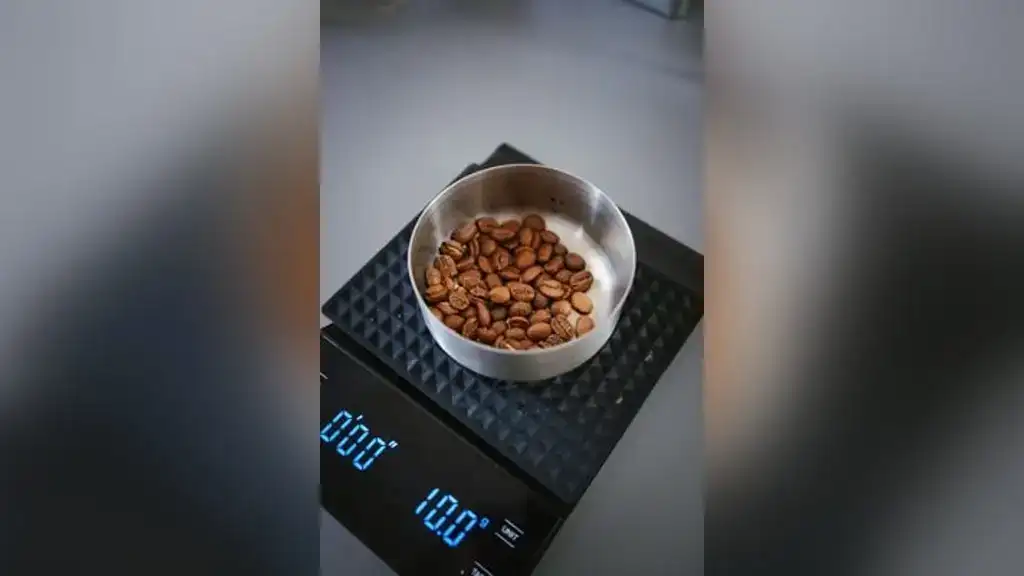
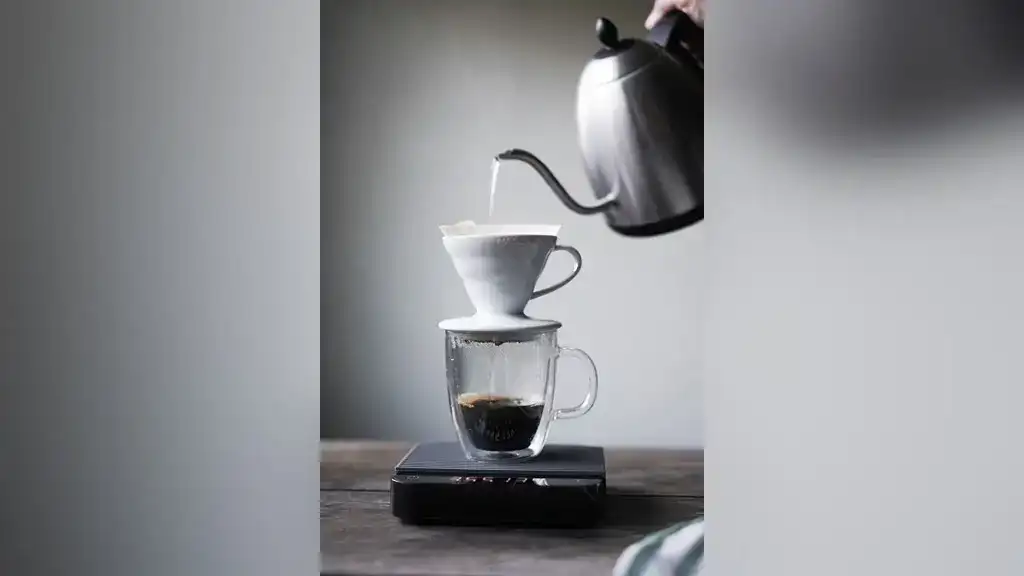
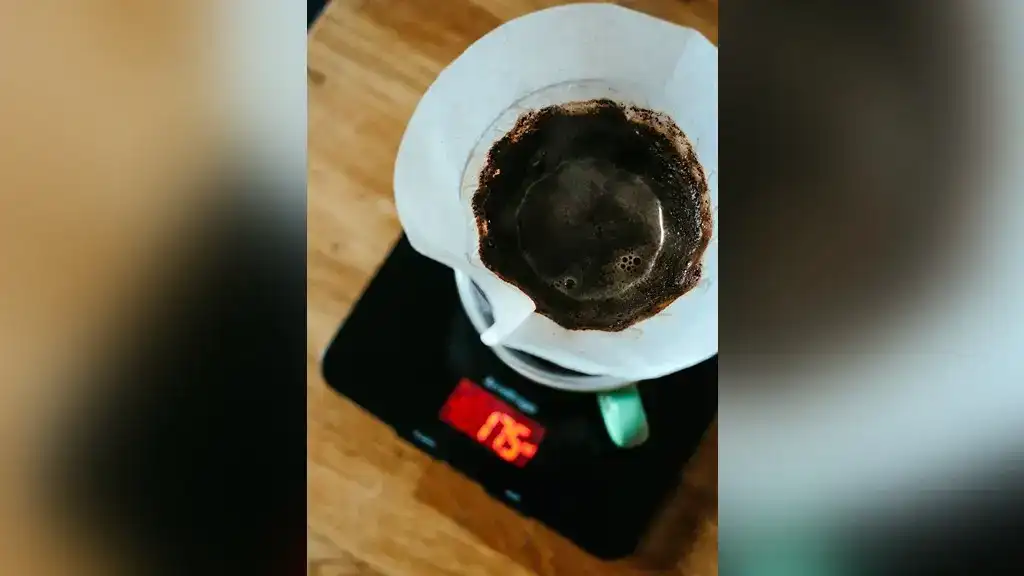
![Best Coffee Scales ([year]) You Shouldn't Miss! Best-Coffee-Scales-You-Shouldnt-Miss-1](https://coffeescan.com/wp-content/uploads/Best-Coffee-Scales-You-Shouldnt-Miss-1.webp)
